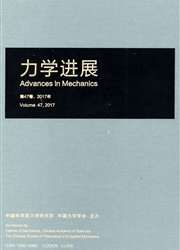

 中文摘要:
中文摘要:
概述了浮区中平行于自由面的表面张力梯度驱动热毛细对流领域的研究.研究兴趣集中于振荡热毛细对流的起振,或者说从定常流动到振荡流动的转捩.起振依赖于一系列的临界参数,临界关系可以表示为这些临界参数的复杂函数.实验结果表明,振荡流中速度的变化和平均流动的速度有相同的量级,向其它量的变化,比如温度和自由面半径的波动,相比于它们的平均量而言则要小得多.因此,起振应是流体中动力学过程的结果,该问题是强非线性的,在过去几十年中,一些理论模型被引入来研究这个问题,使用的方法包括理论分析方法、线性不稳定性分析方法、能量稳定性分析方法以及非定常的三维直接数值模拟.其中直接数值模拟被认为是对强非线性过程进行深入分析的最适合方法,通常能得到和实验较符合的结果.从振荡热毛细对流向湍流的转捩提供了一个研究混沌行为的新系统,开创了一个非线性科学的新前沿,是一个集中了大量近期工作的研究热点.该文对浮区热毛细对流作了一个回顾,包括理论模型和分析,以及实验研究.
 英文摘要:
英文摘要:
This paper provides an overview of ongoing studies in the area of thermocapillary convection driven by a surface tension gradient parallel to the free surface in a floating zone, with emphases focused around the onset of oscillatory thermocapillary convection, also known as the transition from quasisteady convection to oscillatory convection. The onset of oscillation depends on a set of critical parameters, and the margin relationship can be represented by a complex function of the critical parameters. The experimental results indicate that the velocity deviation of an oscillatory flow has the same order of magnitude as that of an average flow, and the deviations of other quantities, such as temperature and free surface radii fluctuations, are much smaller when compared with their normal counterparts. Therefore, the onset of oscillation should be a result of the dynamic process in a fluid, and the problem is a strongly nonlinear one. In the past few decades, several theoretical models have been introduced to tackle the problem using analytical methods, linear instability analysis methods, energy instability methods, and unsteady 3D numerical methods, the last of which is known to be the most suitable for a thorough analysis of strong nonlinear processes, resulting generally in a better agreement with the experimental results. The transition from oscillatory thermocapillary convection to turbulence falls under the studies of chaotic behavior in a new system, which opens a fascinating new frontier in nonlinear science, a hot research area drawing many recent works. This paper, with 93 references cited, reviews theoretical models and analyses as well as experimental studies on thermocapillary connection in floating zones.
 同期刊论文项目
同期刊论文项目
 同项目期刊论文
同项目期刊论文
 期刊信息
期刊信息
